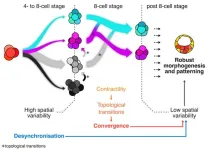(Press-News.org) Pasadena, CA—The world’s freshwater lakes are freezing over for shorter periods of time due to climate change. This shift has major implications for human safety, as well as water quality, biodiversity, and global nutrient cycles, according to a new review from an international team of researchers led by Carnegie Science’s Stephanie Hampton.
Undertaken by scientists based in the United States, Canada, and Sweden, this analysis represents a major call-to-action for wintertime freshwater ecology research. It is published in Science.
The world has millions of freshwater lakes, most of which freeze during the winter. The team’s rigorous review indicates a massive shift in lake ice duration over the past 25 years, with melting starting at least a month earlier than in previous centuries.
“The average duration of iced-over conditions has decreased by 31 days over the last 165 years and thousands of lakes that historically froze over every winter now experience ice-free years,” Hampton explains. “This has major implications for communities around the world that depend on these lakes for drinking water, recreation, fishing, and ice-road transportation, as well as for spiritual and cultural identity.”
The Deputy Director for Carnegie Science’s Biosphere Sciences and Engineering division, Hampton is a freshwater ecologist with 18 years of experience studying microscopic plankton in Lake Baikal in Siberia. For the past decade, she has been broadening the scope of her work to address global trends in lake ice in a warming world.
The team’s analysis breaks down the ecological harm caused by ice loss ranging from the health of individual lakes to the delicate balance of dynamic cycles that comprise the Earth System.
The researchers make the case that studying lakes during wintertime—traditionally avoided due to logistical challenges and safety concerns—must be undertaken by ecologists around the world in order to truly understand the wide-ranging risks posed by ice loss. Their paper identifies several key areas for additional study that have major implications for human and environmental health.
Crucially, shorter ice duration and warmer temperatures affect biogeochemistry and microbial metabolism in lakes and put them at greater risk for water quality impairments, according to Hampton and her collaborators. For example, toxic blooms of cyanobacteria can form in warmer water, putting both fish and humans at risk. Further complicating the situation, the low-oxygen conditions caused by these blooms can release metals that are sequestered in lakebed sediment, posing additional water quality concerns.
Changes in ice duration also have implications for the biodiversity of lake ecosystems, the researchers indicate. For example, temperature changes can allow invasive species that are adapted to warmer water to thrive while cold-water fish and other organisms are negatively affected.
The researchers point out the importance of further research on how loss of lake ice is affecting the global carbon cycle. Evidence indicates that ice cover enables lakes to sequester carbon from the atmosphere and warming water releases more methane, nitrous oxide, and other greenhouse gases.
Furthermore, ice loss both results in increased evaporation of lake water—which over time could decrease the surrounding community’s access to freshwater—and potentially exposes those living nearby to more intense snowfall events and greater erosion. Additional research is needed to understand the many ways that lakes contribute to the water cycle in a warming world.
“It is abundantly clear that many lakes are freezing later, melting earlier, or both,” Hampton asserts. “Over a billion people live near lakes that freeze, and these changes are now affecting people’s uses of lakes. By analyzing what we know about how these changes are affecting lake ecosystems and human communities, we have identified key topics that must be studied in greater detail. It is only by understanding the breadth and complexity of these risks that we can develop strategies for mitigating them.”
Although scientists like Hampton have been studying the ecology of Northern Hemisphere and high-elevation lakes for decades, wintertime lake research is an emerging field. Hampton and other colleagues are at the forefront of advancing safe research protocols in iced-over conditions. Earlier this year, she and her collaborators hosted “winter school” at Wisconsin’s Trout Lake, where early career researchers were trained in how to safely take samples from iced-over bodies of water.
“Looking ahead, we need to invest in a deeper understanding of the crucial roles that lake ice plays in the health of our planet and in the communities that depend on these bodies of water,” Hampton concludes.
The Science paper’s co-authors include Carnegie Science’s Ryan McClure, along with Stephen Powers of Baylor University, Hilary Dugan of the University of Wisconsin, Lesley Knoll of Miami University of Ohio, Bailey McMeans of the University of Toronto, Michael Meyer of the U.S. Geological Survey, Catherine O’Reilly of Illinois State University, Ted Ozersky of the University of Minnesota, Sapna Sharma of York University, David Barrett of the University of Calgary, Sudeep Chandra of the University of Nevada, Joachim Jansen and Gesa Weyhenmeyer of Uppsala University, Milla Rautio of the Université du Québec, and, Xiao Yang of Southern Methodist University.
__________________
Founded in 1902, Carnegie Science is an independent research institution that pursues scientific breakthroughs to transform our understanding of life, planets, and the universe. Carnegie Science
researchers ask and answer the biggest questions of our time, defining new areas of study and leading bold investigations in the life and environmental sciences, Earth and planetary science, and astronomy and astrophysics. Building on more than a century of groundbreaking discovery, Carnegie Science advances basic science to expand the frontiers of knowledge for all.
END
Loss of lake ice has wide-ranging environmental and societal consequences
Many lakes are freezing later, melting earlier, or both. These changes affect more than a billion people worldwide.
2024-10-10
ELSE PRESS RELEASES FROM THIS DATE:
From chaos to structure
2024-10-10
Pipetting liquids into tiny test tubes, analyzing huge datasets, poring over research publications—all these tasks are part of being a scientist. But breaking this routine is essential. Time away from the usual work environment can spark creative ideas. Lab retreats, for instance, offer a great setting where researchers can engage with other peers, often leading to new collaborations.
The latter was true for Bernat Corominas-Murtra and Edouard Hannezo from the Institute of Science and Technology Austria (ISTA). Fascinated by a dataset showcased during a poster session at a collaborative ...
Variability in when and how cells divide promotes healthy development in embryos
2024-10-10
There is variability in when and how cells divide during the development of embryos. While researchers traditionally believed this variability was an obstacle that needed to be regulated, the Hiiragi group now found that it actually promotes healthy development. The results, published in Science on 11 October 2024, encourage other scientists to see the potential of variability and could have significant impact on assisted reproductive technology.
An embryo consists of cells. These cells divide to make new cells, allowing the embryo to grow. The cells experience variability in how and when they divide and in how they interact with each other. Scientists ...
Hidden biological processes can affect how the ocean stores carbon
2024-10-10
New Stanford-led research unveils a hidden factor that could change our understanding of how oceans mitigate climate change. The study, published Oct. 11 in Science, reveals never-before seen mucus “parachutes” produced by microscopic marine organisms that significantly slow their sinking, putting the brakes on a process crucial for removing carbon dioxide from the atmosphere. The surprising discovery implies that previous estimates of the ocean’s carbon sequestration potential may have been overestimated, but also paves the way toward improving climate models and informing ...
European forest plants are migrating westwards, nitrogen main cause
2024-10-10
New research reveals nitrogen pollution, and to a lesser extent climate change, unexpectedly as the key driver behind surprising westward shifts in the distribution of plants.
A recent study has uncovered that many European forest plant species are moving towards the west due to high nitrogen deposition levels, defying the common belief that climate change is the primary cause of species moving northward. This finding reshapes our understanding of how environmental factors, and in particular nitrogen pollution, influence biodiversity.
While it is widely assumed that rising temperatures are pushing many species toward cooler, northern areas, this research shows that westward ...
Macronutrient and micronutrient intake among US women ages 20 to 44
2024-10-10
About The Study: This cross-sectional study of pregnant and nonpregnant women of reproductive age found that vitamin A, vitamin C, and iron intake decreased over the past 2 decades, which may have substantial maternal and fetal health implications. By identifying these nutrient gaps and trends in inadequate intake in this at-risk population, scientific, health care, and regulatory communities may be better poised to adopt recommendations to improve nutrient intake.
Corresponding Author: To contact the corresponding author, Derek Miketinas, PhD, RD, email dmiketinas@twu.edu.
To access the embargoed study: Visit our For The Media website ...
Payments by drug and medical device manufacturers to us peer reviewers of major medical journals
2024-10-10
About The Study: More than half of the 1,962 U.S. physicians included in this study who peer reviewed for the most influential medical journals received industry payments in 2020-2022, with most payments for research. Research payments, especially those provided to an institution, may have different implications than general payments for conflicts of interest.
Corresponding Author: To contact the corresponding author, Christopher J. D. Wallis, MD, PhD, email wallis.cjd@gmail.com.
To access the embargoed study: Visit our For The Media website at this link https://media.jamanetwork.com/
(doi:10.1001/jama.2024.17681)
Editor’s Note: Please see the article ...
One-third of cancer-related crowdfunding campaigns share medical financial hardship and health-related social needs, new research shows
2024-10-10
In a new, large comprehensive analysis led by the American Cancer Society (ACS), researchers, using a form of Artificial Intelligence (AI), found that more than one-third of fundraising stories on the GoFundMe crowdfunding platform in the United States explicitly shared experiences of medical financial hardships and health-related social needs (HRSNs). The fundraising stories included hardships such as housing and food insecurities, transportation barriers, income loss, lack of sick leave, and disruptions to both work and school. The findings are published today ...
Faulty 'fight or flight' response drives deadly C. difficile infections, research reveals
2024-10-10
The portion of our nervous systems responsible for the “fight or flight” response can shape the severity of potentially deadly C. difficile infections, new research from the University of Virginia School of Medicine reveals.
The findings suggest that doctors may be able to save patients from the infections – a plague for hospitals and nursing homes – by using drugs to quiet the hyperactive nervous system response, the researchers say.
“Compared to how much we know about immune system influences in C. difficile infections, the field is just scratching ...
Checking out the boundaries: Milestone in lipidomics achieved
2024-10-10
Results of the first phase of a Ceramide Ring Trial have just been published in the renowned journal Nature Communications, representing a significant landmark in the field of lipidomics. This achievement, involving researchers at the University of Vienna and scientific teams in Singapore, Julich and Espoo, represents a groundbreaking advance in the establishment of ceramide reference values, plasma lipids involved in such as cardiovascular diseases. The ring trial was performed under the umbrella of the International Lipidomics Society ...
SNU-KAIST researchers jointly develop a new visible light communication encryption technology using chiral nanoparticles
2024-10-10
Seoul National University(SNU) College of Engineering announced that a joint research team led by Professor Ki Tae Nam from the Department of Materials Science and Engineering at SNU and Professor Junil Choi from the Korea Advanced Institute of Science and Technology (KAIST) has developed a novel visible light communication encryption technology with high security using chiral nanoparticles.
Just as a lighthouse provides a guiding beam in the vast darkness of the sea, light-based information transmission has been a crucial means of communication throughout human history. ...
LAST 30 PRESS RELEASES:
Alkali cation effects in electrochemical carbon dioxide reduction
Test platforms for charging wireless cars now fit on a bench
$3 million NIH grant funds national study of Medicare Advantage’s benefit expansion into social supports
Amplified Sciences achieves CAP accreditation for cutting-edge diagnostic lab
Fred Hutch announces 12 recipients of the annual Harold M. Weintraub Graduate Student Award
Native forest litter helps rebuild soil life in post-mining landscapes
Mountain soils in arid regions may emit more greenhouse gas as climate shifts, new study finds
Pairing biochar with other soil amendments could unlock stronger gains in soil health
Why do we get a skip in our step when we’re happy? Thank dopamine
UC Irvine scientists uncover cellular mechanism behind muscle repair
Platform to map living brain noninvasively takes next big step
Stress-testing the Cascadia Subduction Zone reveals variability that could impact how earthquakes spread
We may be underestimating the true carbon cost of northern wildfires
Blood test predicts which bladder cancer patients may safely skip surgery
Kennesaw State's Vijay Anand honored as National Academy of Inventors Senior Member
Recovery from whaling reveals the role of age in Humpback reproduction
Can the canny tick help prevent disease like MS and cancer?
Newcomer children show lower rates of emergency department use for non‑urgent conditions, study finds
Cognitive and neuropsychiatric function in former American football players
From trash to climate tech: rubber gloves find new life as carbon capturers materials
A step towards needed treatments for hantaviruses in new molecular map
Boys are more motivated, while girls are more compassionate?
Study identifies opposing roles for IL6 and IL6R in long-term mortality
AI accurately spots medical disorder from privacy-conscious hand images
Transient Pauli blocking for broadband ultrafast optical switching
Political polarization can spur CO2 emissions, stymie climate action
Researchers develop new strategy for improving inverted perovskite solar cells
Yes! The role of YAP and CTGF as potential therapeutic targets for preventing severe liver disease
Pancreatic cancer may begin hiding from the immune system earlier than we thought
Robotic wing inspired by nature delivers leap in underwater stability
[Press-News.org] Loss of lake ice has wide-ranging environmental and societal consequencesMany lakes are freezing later, melting earlier, or both. These changes affect more than a billion people worldwide.






